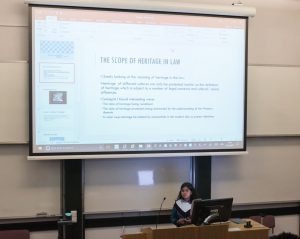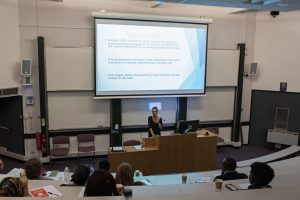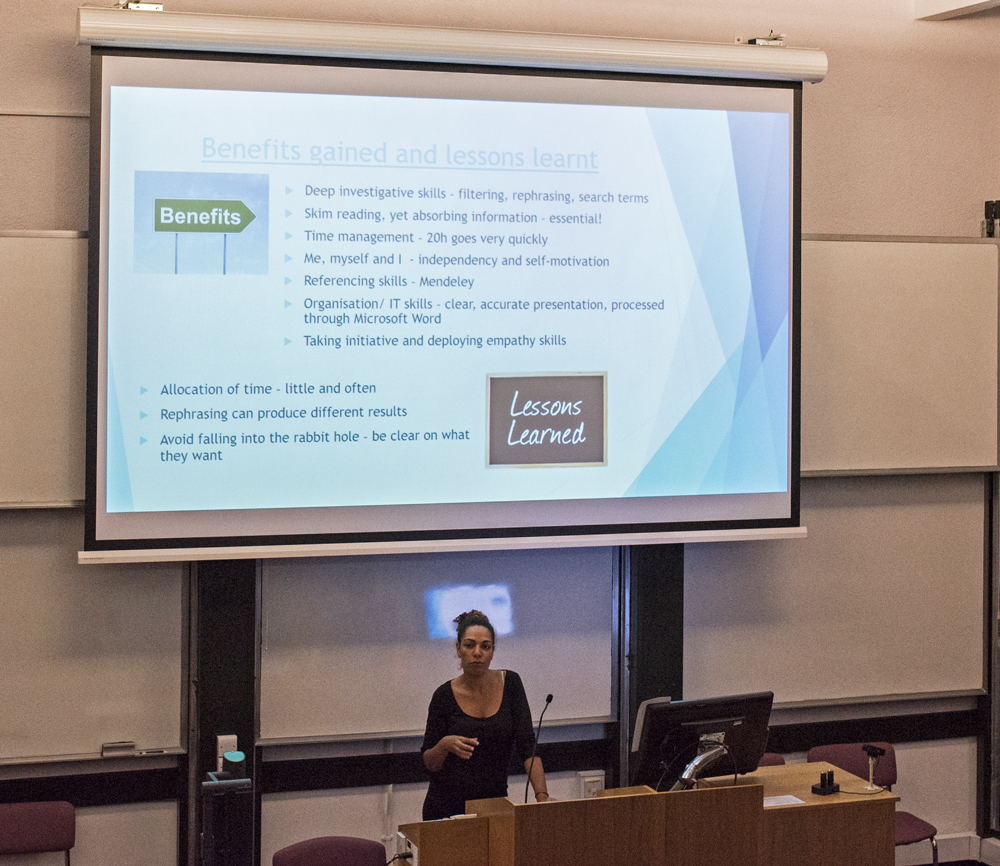Kent Law School’s Research Assistantship Scheme culminated in a day of presentations last week for more than more than 20 law students who had been selected to work on short-term research projects.
The scheme, now in its fourth year, enables undergraduate and postgraduate taught students to develop and extend their skills in desk based legal and socio-legal research by working on an in-depth research project under the direction of an academic from the Law School.
The students, selected from amongst 40 who applied for the paid positions, spent six weeks undertaking their research before gathering together on Thursday to share their findings and experiences in a series of 10-minute presentations.
During their presentations, as well as sharing the scope and topic of their research project, students reflected upon the scheme itself and considered what they had learnt.
Law Lecturer Nick Piska, who managed the scheme said: ‘Our aim, with the presentation day, was to provide an informal and supportive environment in which students could reflect upon their work. It was also a gentle introduction to the “other” side of the academic research environment – having done the research they then had a chance to enjoy sharing some of their findings.’
The scheme, first piloted at the School in 2014, involves an open call to academic staff who wish to have a research assistant for a fixed period in June and July. The research assistant jobs (together with individual project titles) are then advertised to Law School students through Kent Union’s Jobshop.
Projects set by staff on the scheme vary broadly but can include: a literature review on a particular topic; creation of a database; scoping potential research projects; assisting with funding bids; assistance with teaching projects; knowledge transfer projects; and scholarship projects such as reports, blogs, newsletters etc.
This year applicants were selected by a panel comprising Nick, Steve Crawford (a part-time director of the scheme from the postgraduate research community) and Jayne Instone, the School’s Employability and Career Development Officer. Successful applicants were then assigned to a particular staff project with staff members responsible for providing guidance as to the specific nature of the work required over the duration of placement.
Nick and Steve oversaw the provision of research training and day to day supervision. They also ensured a reasonable plan and schedule of work was agreed between staff and students with both parties having a shared expectation of what the project outcome would be.
Steve said: ‘The scheme is run to provide an opportunity for students to experience a more in-depth research environment, working on an extended research project to a greater depth of study than is available during most taught law degrees. It also provides useful work experience for students who might consider research based career paths, and helps to give an insight into the nature of the current projects being undertaken by Kent Law School staff.’
Research assistant Andrew Clarke, a second-year undergraduate student studying English and Spanish Law, said: ‘ The Research Assistantship Scheme provided me with invaluable insight about conducting academic research within a set time frame. The independent nature of the scheme coupled with the opportunity to work alongside legal professionals allowed me to develop useful time management and research techniques which I can apply in further studies, such as a PHD or research masters, as well as during the remaining years of my undergraduate degree where I will be able to enhance the quality of my written assignments.’
Final year Law LLB student Aastha Aggarwal said: ‘Apart from the educational advantage, the scheme helped me build up on key skills such as analytical and critical thinking. Moreover, the work hours were quite flexible which meant that I could easily take on other commitments. Overall, it was a great experience.’
Professor Sally Sheldon, who participated in the scheme, was impressed by the quality and variety of research work undertaken by students: ‘It was clear that the students who had been involved had got an awful lot out of their participation.’
Senior Lecturer Sebastian Payne was also impressed by the students’ presentations: ‘It was very encouraging to see such talented students (undergraduate and postgraduate) fired up by their research work.’

The full list of students who participated in this year’s scheme, together with the topics they researched is as follows:
- Rachel Bale: e-conveyancing – law and/as technology
- Freya Rawlins: Multi-lateral trade and the inward turn
- Nusrat Khan: Critical approach to cultural heritage law
- Mark Nagy-Miticzcky: Ten years after – was the great recession a critical juncture? International Law
- George Hill & Luminita Olteanu: The Iraq Inquiry – evaluating the impact of the international law submissions on the Chilcot Report
- Isdore Ozuo: Resistance and the museum of international law Pamela Enekebe: Humanitarian complicity
- Faraz Yousafzai: ISIL, foreign fighters and the emerging architecture of global security law
- Andrew Clarke: Lists, databases and global security law Gender and Equality 1
- Toluwani Mokuolou & Aastha Aggarwal: The Abortion Act – a biography
- Suleen Latif & Anthony Dillon: Decriminalisation of abortion
- Olohirere Longe & Rachel Bale: Feminist constitutionalism – a comparative analysis of constitutional provisions
- Kylie Ochuodho: Diverse unities of law – leadership and diversity in law schools
- Mihai Covrig: Rights of unmarried cohabitants in the UK
- Daniel Bradbury & Roxana Cioara: Labour exploitation and illegal migrant workers
- Sam Todd: The first women police
- Amy Marsella: Reimagining the state and conservative Christian anti-gay withdrawal
- Joshua Grundy: Housing regulation in British seaside towns
- Sudip Sarker: Regulations relating to buildings in England and Wales – a review of legislation


